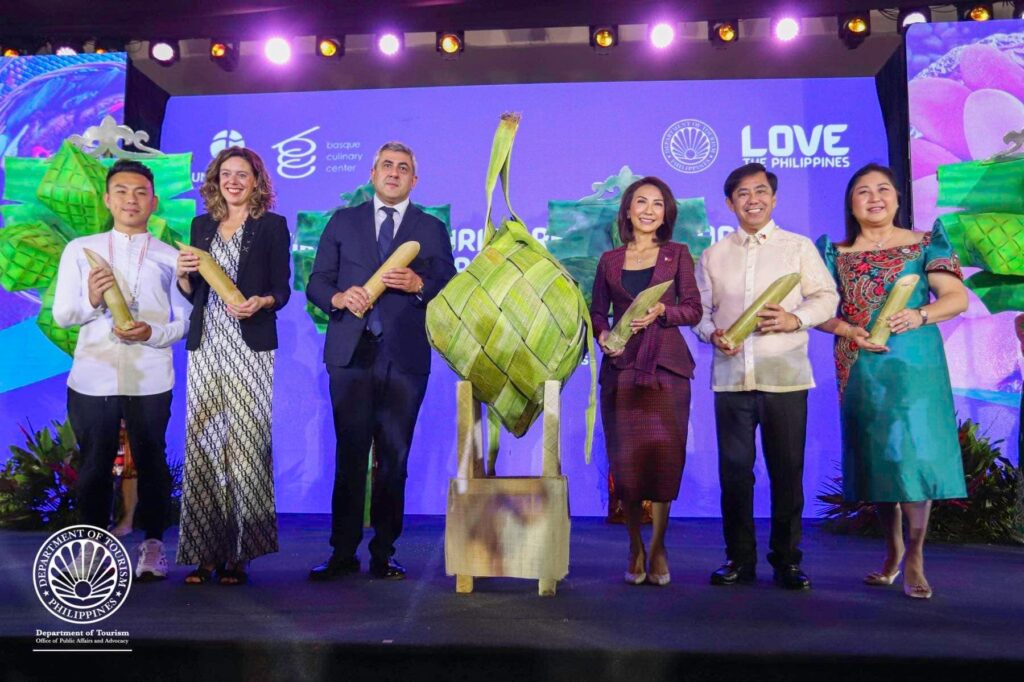
From left to right: Idoia Calleja, Director of Masters and Courses, Basque Culinary Center; UN Tourism Secretary-General Zurab Polikashvili; Philippine Tourism Sec. Christina Frasco; and Lapu-Lapu City Mayor Ahong Chan during the ceremonial making of the puso or hanging-rice to mark the start of the 1st UN Tourism Regional Forum on Gastronomy in the Asia-Pacific held in a resort in Lapu-Lapu City, Mactan on June 26, 2024. | Photo from DOT
CEBU CITY, Philippines – Historic Cebu should leave a legacy in the world’s gastronomy scene.
This is what the top official of the United Nations Tourism Organization (UN Tourisn) urged stakeholders to consider as the island province made history once again by being the venue of the inaugural forum on promoting gastronomy tourism.
On Wednesday, June 26, the UNTO and the Department of Tourism (DOT) launched the first UN Tourism Regional Forum on Gastronomy in the Asia-Pacific.
In his speech, UN Tourism Secretary-General Zurab Polikashvili challenged tourism players here to establish a gastronomy and culinary center.
“And what is my proposal is to leave a legacy… to create something an education center or gastronomic center here in Cebu. We have to do it and it has to be a legacy,” said Polikashvili.
The UN Tourism Regional Forum on Gastronomy Tourism in the Asia-Pacific is the first program launched to promote culinary and food culture in the region.
They partnered with Spain’s renowned Basque Culinary Center to support and help tourism stakeholders in the region promote and develop effective ways to establish gastronomic tourism experiences.
The two-day series of knowledge-sharing and seminars kicked off at a hotel in Mactan, Cebu with the participation of over 500 delegates from at least 40 member-states.
Dozens of chefs from around the Philippines also flew to Cebu to showcase the best of Filipino food from various regions during the global event.
Gastronomy tourism
The UN Tourism defined gastronomy tourism as “a way of promoting understanding among different cultures, and of bringing people and traditions closer together.”
To put it simply, it’s an approach that puts food culture and the entire gastronomic experience as the driving factor to attract tourists to learn and immerse themselves in new destinations.
“Gastronomy is one of the sectors that show the way of life. When we travel we like to discover the local cuisines, destinations, restaurants, the taste, products, traditions, and to be able to have an authentic experience,” said Idoia Calleja, director of masters and courses at the Basque Culinary Center.
Recently, surveys from market research firms showed that there is an increasing interest from travelers who want to try out food from other places, said Sandra Carvao, director for market intelligence, policies and competitiveness of UN Tourism.
Citing findings from a study made by American banking institution American Express, around 81 percent of travelers look forward to trying local food of the destination they’re heading to.
In addition, 79 percent of tourists surveyed expressed interest in experiencing new food while another 37 percent said visiting a specific restaurant formed of their travel plans or itinerary.
“So restaurants themselves or the gastronomic experience has become an asset, a decision factor for tourists and this is what we really need to address and use gastronomy tourism as an added value,” said Carvao.
‘Put Filipino food in the global spotlight’
Here in the Philippines, Tourism Secretary Christina Garcia-Frasco vowed to pushing gastronomy tourism as one of their priority programs not only as means to boost the local tourism industry but also to “put Filipino food and culture in the global spotlight.”
Frasco also revealed plans of establishing a Filipino Gastronomy Roadmap.
Its goals include protecting the integrity of Filipino food culture as well as ensuring that players in the gastronomy tourism experience gets ample support from the government.
The initiative, in addition, aims to promote inclusivity in Filipino culture by showcasing Filipino dishes from all regions – not only the popular but also undiscovered ones.
“We understand that this also requires a whole-of-nation approach as well as a whole-of-government approach, which is why we are now in the process of drafting a Filipino gastronomy sustainable tourism roadmap,” explained Frasco. /clorenciana
READ MORE
UN Tourism: Over 300 delegates to arrive in Cebu
PH’s tourism investments in 2023 reach P509B

